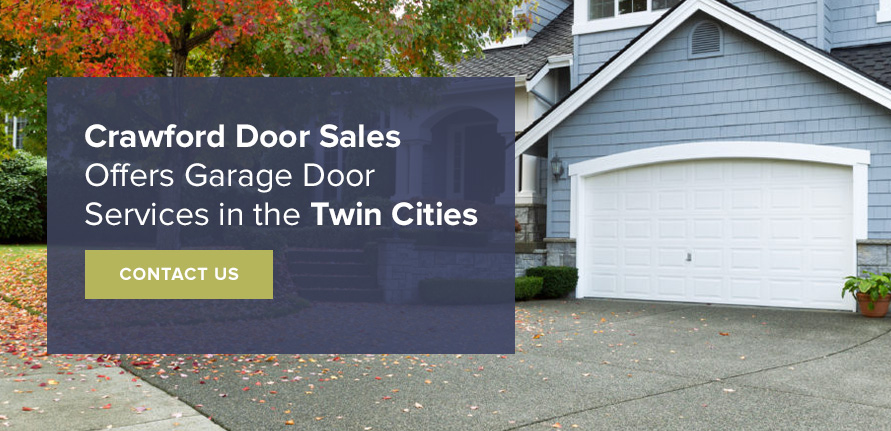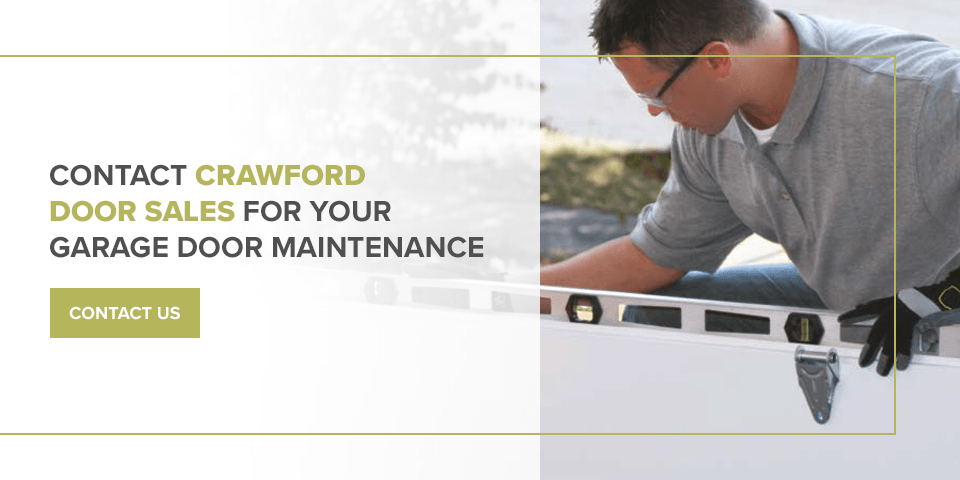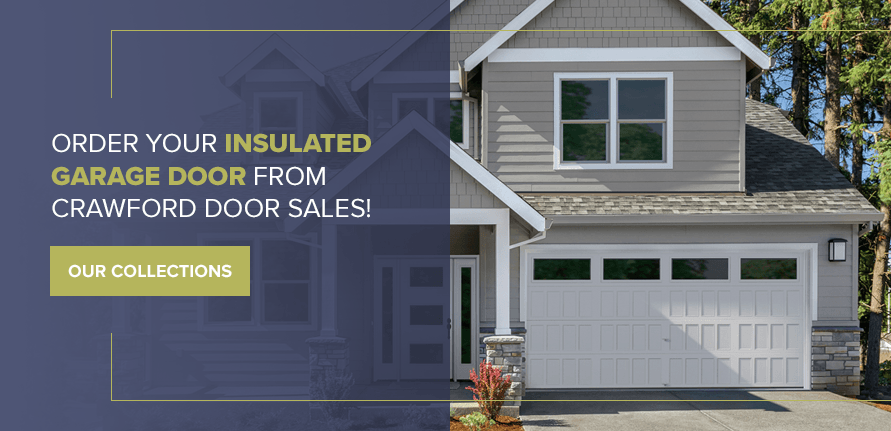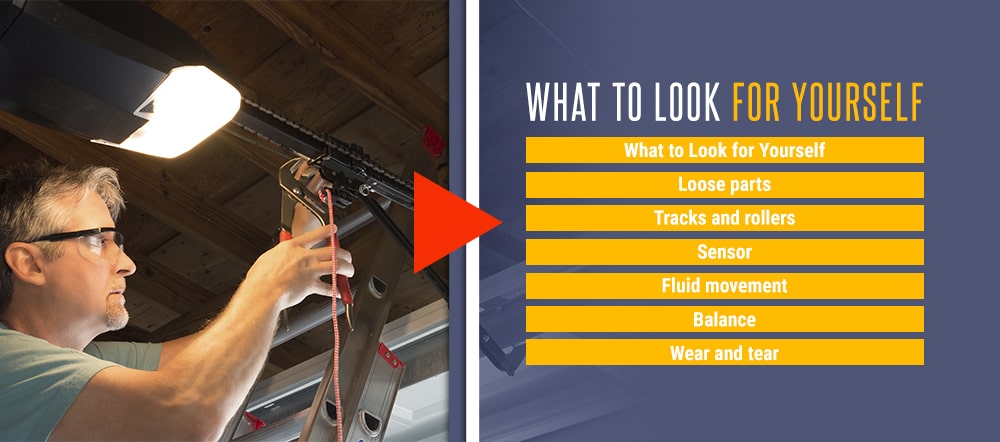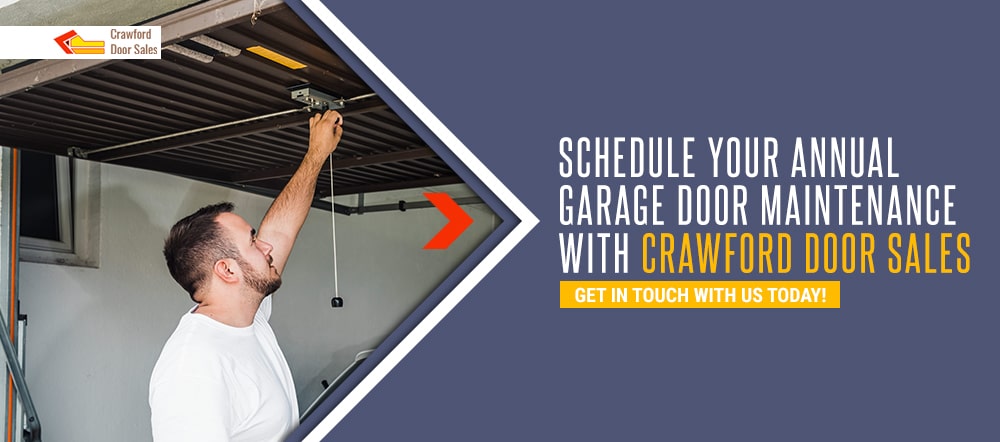What to Do if You Back Into a Garage Door
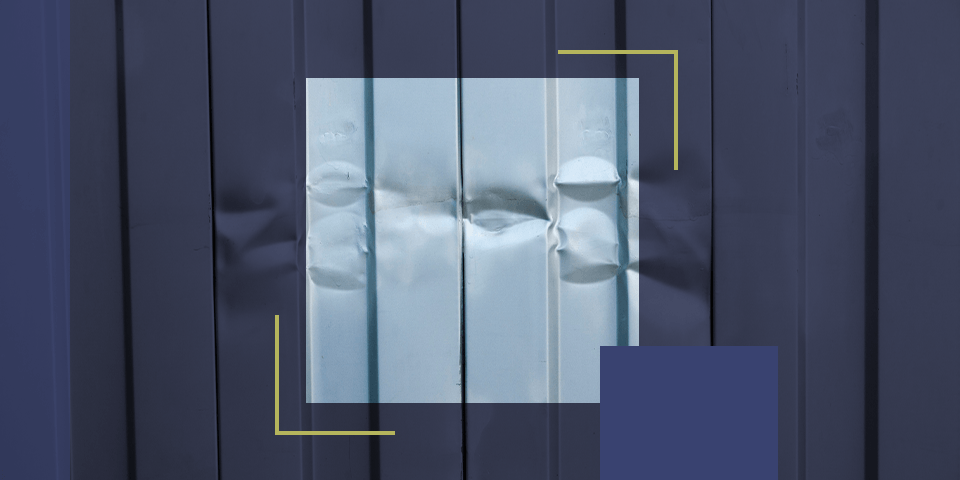
Mistakes happen. One minute, you’ve got plenty of room between the rear of your car and the garage door — the next, you hear the sound of an impact. While backing into a garage door can be frustrating, there are steps you can take to prevent further damage and ensure your family’s safety.
1. Stop Your Car and Make Sure Everyone Is Okay
Whether you’ve bumped the garage or backed fully into the door, do not move your car right away. Instead, stay calm. Turn off the engine and put the parking brake on. Then check with your loved ones — inside the vehicle and the house. If no one is injured, you can shift your focus to the damage caused to the garage and your car.
2. Perform an Initial Inspection
Before you move your car, check for damage inside and out. Depending on the extent of the damage, it may be unsafe to move your vehicle without professional assistance. During your initial walk-through, take lots of photos, as you may need these to file claims with your home and auto insurance.
3. Carefully Move Your Car
If you feel safe to move your car, do so cautiously. Ensure everyone is clear of the garage, as moving your vehicle may cause the door to fall or shift.
If you hit your door from the inside, move the car forward slightly. If you hit it from the outside, move your car down the driveway or onto the street.
4. Assess the Damage
Now it’s time to take a closer look at your garage door and your car. Most of the time, the garage takes the brunt of the damage, with vehicles suffering a few scrapes or scuffs. You’ll want to inspect your garage door and its components closely, checking for dented, scraped or broken parts.
Some of the most common issues caused by backing into a garage door include:
- Broken or damaged door panels
- Off-balance or off-track doors
- Warped or broken brackets or support hardware
- Snapped torsion or extension springs
- Bent tracks
- Damaged photo eye sensors
Again, take pictures of anything that appears broken or damaged. If you notice obvious damage, do not proceed to the next steps. Contact a professional garage door repair technician immediately.
5. Check Whether the Door Operates
If the garage door appears fine, your next step is to check if it still functions. Exercise extreme caution when performing this action. If there is an underlying issue or misalignment, attempting to operate the door could cause further damage to the system.
You can test the door’s operability manually. Disconnect the automatic opener by slowly pulling the T-shaped handle attached to the emergency release cord. Then, physically move the door up and down. Be alert for:
- Lack of movement
- Difficulty moving
- Unusual noises
If anything seems off, stop what you are doing and contact a garage door professional for service.
6. Schedule a Garage Door Repair
Serious garage door damage is not always apparent. Even if you don’t find any visible breaks or dents, there may be an underlying issue that could impact the function of your door. If everything appears alright, schedule a garage door repair so a professional can inspect the intricate mechanisms that run the system. They can either confirm that everything is operational or provide a repair estimate.
Contact Crawford Door Sales for Twin City Garage Repairs
For more than 60 years, Crawford Door Sales has helped Twin City homeowners with all their garage door needs. If you back into your garage door, call our family-owned company for outstanding repair services.
Let us assess the damage and keep your door in tip-top shape. We can replace damaged panels and address off-balance or off-track garage doors. We can also repair or replace any damaged or broken components — such as rollers, tracks and hinges.
The professionals at Crawford Door Sales look forward to getting your day and your garage back on track. Contact us today to schedule a repair service.
What to Do If There Is Water Damage in Your Garage
Whether you’re dealing with water leaking into your garage when it rains or excess humidity, moisture can cause various issues, damaging the building’s structure and ruining stored items. Learn how to dry your leaking garage and prevent future water intrusion with Crawford Door Sales.
1. Pinpoint the Source
Start by finding where the water is coming from and completing any necessary repairs to prevent another leak the next time it rains.
Water accumulation around the garage’s foundation is a common issue, and depending on your property’s placement, you may need to install drains to direct water away. Similarly, clogged, damaged or misaligned gutters can send rainwater directly into your garage. An aging garage is also more likely to let water in. Leaking roofs, cracked concrete and worn garage doors are some of the most common places where water enters.
If you have a severe leak, the entry point may be easy to see. In other cases, you may need to look for stains or other signs of water damage to find the source.
2. Keep More Water From Entering
Depending on the source of the leak, you may need to reinsulate your garage, fix holes in the roof, clean your gutters or address other problems to stop the water. Some causes are small, and you can take care of them on your own.
More complex repairs, landscaping changes and garage door updates are better left to professionals. You may also want to reach out to an expert for a foundation inspection to ensure you catch any issues — such as cracking concrete or other effects of prolonged water damage — before they can worsen.
3. Remove the Water and Dry out Your Garage
Without intervention, water can cause various secondary issues, from damaging the ceiling, walls and floor to encouraging mold growth. Cleaning up the water and airing out your garage is essential for minimizing the damage and drying it out as soon as possible.
Renting a commercial dehumidifier is an effective option for an overly humid garage. However, spaces with standing water require more effort and equipment to dry them properly. Open your garage, mop up any standing water and remove belongings that need to be dried or disposed of. From there, you can set up fans to speed up the drying process. Keep in mind that some water damage may be hidden, so look for water stains and soft drywall, which may require you to replace wet insulation.
4. Keep Your Garage Door in Excellent Condition to Prevent Future Water Damage
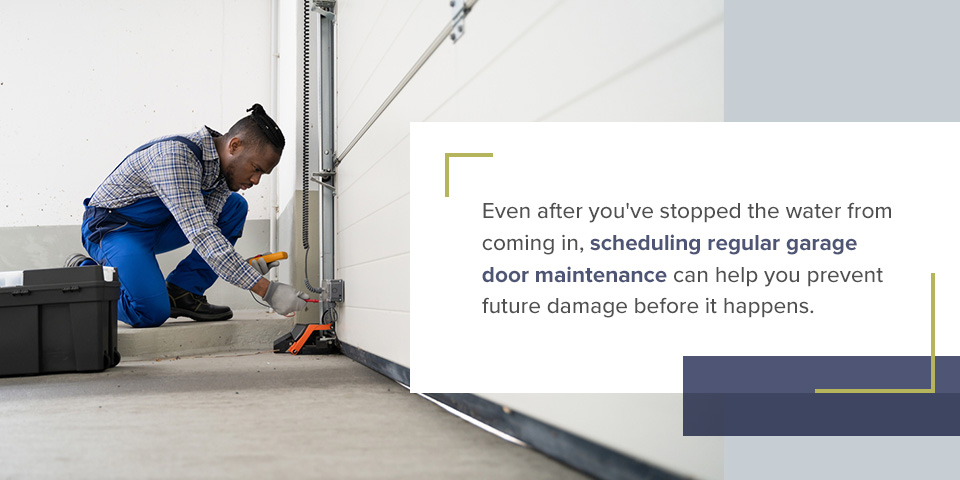
Even after you’ve stopped the water from coming in, scheduling regular garage door maintenance can help you prevent future damage before it happens. An experienced technician will look for damaged weatherstripping, gaps and other issues that could lead to leaks later. The earlier you can catch these problems, the more longevity and value you can get from your overhead door.
Even the best-kept property eventually requires updates. If your garage door is old and lets water in, you may need to buy a new one to prevent flooding in the future. A high-quality overhead door creates a tight seal that keeps water out, and features like a robust rubber seal and insulation can help you keep your garage dry. Many modern models also offer excellent climate control, helping you keep your garage’s temperatures comfortable and reduce humidity inside.
Protect Your Garage With a High-Quality Door From Crawford Door Sales
Crawford Door Sales has been the Twin Cities’ trusted garage door company since 1958. We carry stunning residential garage doors from manufacturers like Clopay® and trusted commercial solutions from Cornell and Cookson to deliver lasting performance and protection. Beyond sales and support, our experienced technicians perform comprehensive maintenance and repair services that extend your garage door’s life span.
Whether you’re dealing with a leaking garage or want to schedule a preventive maintenance visit, the team at Crawford Door Sales can help. Browse our garage doors or request service today.
5 Warning Signs It’s Time for a New Garage Door
5 Warning Signs It’s Time For A New Garage Door
If you’re like many homeowners, you may not give much thought to your garage. It’s a place to put your car and store a few items you don’t want, need or have room for inside your house.
However, whether it’s an attached or a stand-alone structure, your garage can begin to show signs of age. An older garage can start to deteriorate, which may require a complete replacement. The door is one area that demands attention to ensure it’s functioning correctly and safely.
Leading Indicators of a Garage Door Replacement
Some symptoms pointing to a garage door upgrade or total structure replacement include:
1. Obvious Signs of Damage
Sometimes, it’s easy to tell when it’s time for a garage replacement. Do you see cracks in the walls or floor? These issues can indicate that the garage’s structural integrity is weakening, eventually creating a dangerous situation. Signs of animal or insect infestations also mean that these critters are finding ways to get inside.
2. Exposure to the Elements
Do you feel drafts in the garage with the door closed? Is rain, snow or wind able to get inside? These situations can be especially bothersome if you use the garage for purposes other than storage, such as a home office or gym. If the elements enter through your garage door, replacing it may help you maintain the space’s comfort.
3. Frequent Repairs
If you’re always fixing something in or around the garage, those repairs could cost a fortune in repair bills. Weighing the costs of frequent service against that of a replacement is common when deciding whether a new garage door is necessary. Investing in a new one can be a significant investment, but it can also help you save money long-term.
4. Loud Door Noises
If you hear abnormal sounds like grinding, squeaking or groaning, it likely indicates a severe mechanical issue requiring immediate attention. A sudden, loud bang usually means a snapped spring, creating a potentially dangerous situation.
5. Sagging Door
A door that sags, looks uneven or becomes unbalanced is another cause for concern. Practice caution and call a professional immediately, as these signs often mean the door is ready to fall.
Crawford Door Sales Offers Garage Door Services in the Twin Cities
If you live in the Twin Cities area and experience problems with your garage door, the experts at Crawford Door Sales can meet all your replacement and repair needs. Contact us to request additional information or schedule a convenient service appointment today.
How to Open and Close Your Garage Door During a Power Outage
The greater Twin Cities area captivates many residents with its natural beauty, low cost of living and almost endless entertainment opportunities. Yet, recent climate data shows our communities also attract more intense storms. That can mean more frequent power outages that prevent you from using your garage’s opening system. When that happens, you need to know how to open your garage door without a remote opener.
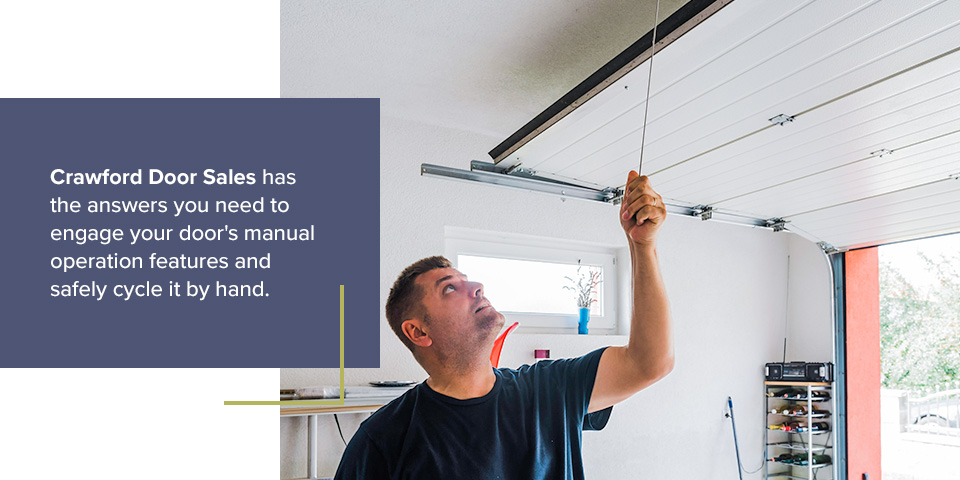
Crawford Door Sales has the answers you need to engage your door’s manual operation features and safely cycle it by hand.
Step-By-Step Guide to Manual Garage Door Operation
Follow these steps to use your door when the power’s out.
Conduct an Inspection
To protect your safety, garage door components should be in good condition before you attempt to manually operate your garage door. Inspect your door for loose cables, worn parts or other damage first. If something is concerning, contact your local garage door experts for repair services right away.
Release the Door’s Trigger
Your garage door’s trigger is the red-handled rope suspended from its track. When you pull this, you’re essentially disconnecting the door from the opener. We recommend doing this with the door closed. That way, it can’t descend too quickly and create a safety issue. If you can’t locate the trigger, check for release instructions in your owner’s manual for your opener.
Open the Door
Slowly lift the door with the internal handle. Once you’ve raised it a bit, you can push on the bottom edge to help guide it up and into place. You can then exit the garage and lower the door back down. Engage the door’s manual lock to help prevent unwanted access. If it doesn’t have one, consider upgrading your garage door to a newer, more secure model.
Reconnect Your Opener Once the Power Returns
After the electricity is restored, unlock the manual lock and couple your door and opener again. To do this, you can grab the trigger and pull it toward the door until it clicks into place. Many models also allow you to reconnect the door by using the opener. Hitting the button can help move the springs into place and reunite the trolley and door.
Prepare Your Garage for Future Outages With a New Opener
Crawford Door Sales proudly offers, installs and maintains premium-quality LiftMaster® residential garage door openers. Many models we carry feature battery backup systems for continued performance during a power outage.
Contact Crawford Door Sales for Your Garage Door Needs
Businesses and homeowners throughout the greater Twin Cities area have trusted family-owned Crawford Door Sales since 1958. Connect with us online for more information or to schedule a service call.
How Can You Fix a Noisy Garage Door?

How Can You Fix a Noisy Garage Door?
The garage door is most homeowners’ main entrance to the home. An attractive garage door is one of the best additions to your home’s facade. A newly updated garage door can recoup 94.5% of the cost when you resell your home.
It’s an investment that you want to maintain. You open and close your garage door every day, and it become a major annoyance if it makes a lot noise every time you run it. A loud garage door can impact you, your family, your neighbors and
guests who visit your home.
You’ll need to check a few areas of your garage door that might be the cause of the noise. These maintenance tips can help you fix your noisy garage door opener.
1. Tighten Nuts and Bolts
The noise your garage door is making may be from a loose or missing bolt on the track or door. Loose nuts and bolts can cause your garage door to make a rattling noise.
Make sure you’ve disconnected your garage door opener and informed your family that you’ll be working on the garage door. It can be dangerous if someone opens the garage door while you’re tightening bolts.
Nuts, bolts and screws shouldn’t be too tight on the track or garage door. Tighten them enough to stay in place.
Once you’ve checked to make sure every bolt and screw is tight, test the garage door to see if you’ve fixed your noise problem.
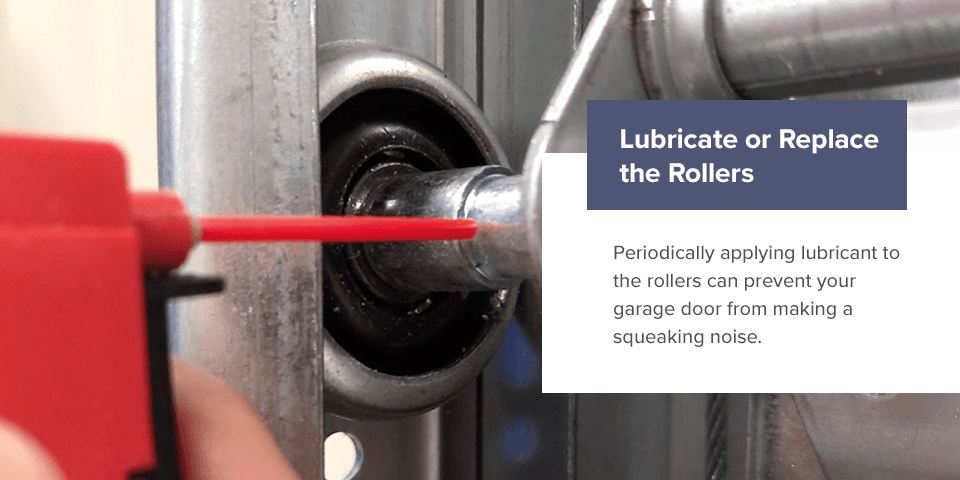
2. Check and Replace worn Rollers
If you hear a noise when the garage door opens and closes, your issue might be the rollers. Rollers are the wheels that run inside the tracks on the sides of the door, guiding it up and down. Rollers can seize up after a time so they no longer
roll in the track. When this happens they can cause a squealing noise as the metal or plastic roller is dragged along the metal track. It is easy to spot a seized roller by carefully watching them as the door operates and locating the source of
the squeal. Rollers are often sealed so there is no way to lubricate but in some cases, you may be able to see the bearings where the roller stem meets the wheel. If this is the case you use a lithium based spray lubricant on this area only to
increase roller longevity.
Do not lubricate the track, it will only collect dust and dirt making if more difficult for the rollers to roll. If you find a seized roller, call a professional to replace as the work often requires removal of track, removing tension from springs and reconnecting cables.
Learn About Our Garage Door Repair Services
3. Check or Replace the Springs
Springs are the central part to the operation of a garage door. They counterbalance the weight of the door so that it can open and close easily and smoothly. In both main kinds of spring, the torsion set up and extension set up, there are
several moving parts including bearing and pulleys that allow shafts to turn and cables to be taken up or let down. All of these areas can be a source of noise if a bearing or pulley fails or seizes. The springs themselves may be fatigued after
years of use and if they are not properly balancing the door can cause stress on the opener which may create additional noise. If you suspect the noise may be coming from your spring system, call a professional to service the door and check
for worn or fatigued parts. It is never recommended you do any work on the spring system yourself as they are highly dangerous.
4. Lubricate or Replace Hinges
Hinges connect each section of your door to the next and allows your door to ‘hinge’ as it moves from closed to open and vice versa. These are fastened to the door by bolts and can become loose after a lot of use. If you checked for loose
nuts and bolts and tightened everything appropriately, check for wear on the hinges. Signs of wear can be quite obvious from large gaps between the hinge straps to crooked hinge pin to cracks. Any one of these can be a source of noise and
often requires the hinge to be replaced. Hinges can also benefit from lubrication which can extend their life and prevent the metal parts of the hinge from rubbing together and creating noise. Lubricate the hinge pin and where the straps
meet the pin. If the hinge needs to be replaced, always swap one hinge at a time and if the hinge is on the end and carrying a roller, be extremely careful. It is always recommended to call a professional for such repairs.
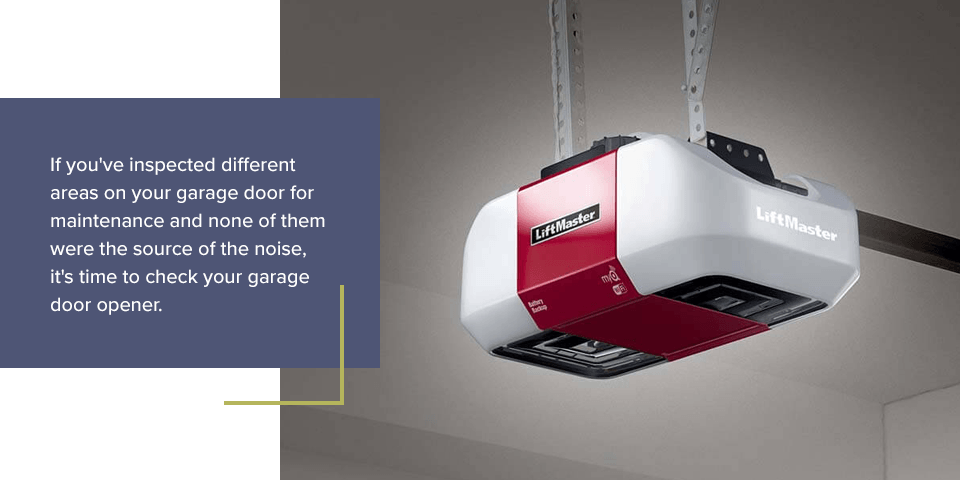
5. Check Garage Door Opener
If you’ve inspected different areas on your garage door for maintenance and none of them were the source of the noise, it’s time to check your garage door opener.
The garage door opener is the device on your garage’s ceiling that operates your door. All the moving parts in the garage door opener can produce noise, and maintenance may be necessary. There are several moving parts inside and outside
the opener which may be the source of noise. It is pretty easy to identify where the noise is coming from be it from the rail with the chain or belt and traveler that connects to your door, or from the motor housing. In the case of the rail,
simple lubrication of the chain/belt may take care of the issue but if the sound is inside the motor housing, do not use any lubricant as most modern openers contain sensitive electronics which can be damaged if liquids get on them. It is
always recommended that a professional service your opener and if quiet operation is a priority, several options are available for extremely quite operating garage door openers.
6. The Weather
Climate will play a huge roll in how a door operates. Though the heat of summer and direct sun can cause some expansion issues, most well maintained doors have very few issues during the warmer months and therefore few abnormal
noises. Winter in our climate can bring a whole host of noise causing problems. Extreme cold can cause mechanical things to work harder causing some additional noise. Some lubrication and maintenance may alleviate some of this noise but
most of the time the noise will subside when the weather warms up a bit. Persistent noise after a warm up may be an indication of an issue talked about above. The biggest complaint during the winter is popping noises. These are often
caused by water getting between the sections and freezing or on the floor and partially freezing the door shut. The best defense in this situation is prevention, keeping melting water from cars or the roof away from the area underneath the
door. Strong bottom weather seal can also aid in keeping your door from freezing shut by keeping cold air from interacting with water inside the garage. There are some options for weather stripping between sections on some model doors or
a small bead of lubricant between sections can also prevent water infiltration and freezing but maintaining good drainage from the door is the most effective solution.
Learn About Our Garage Door Repair Services
7. Call a Garage Door Expert
You can complete some simple garage door repairs by yourself if you have the necessary tools. But other types of garage door maintenance can be dangerous if you’re planning to work on your garage door alone or even with a helper.
Springs and cables are under an extreme amount of tension and if not handled correctly can and will cause significant injury. Garage Door openers are electrically powered and also contain circuit boards, transformers, and other components
that can be dangerous if not handled properly. For your safety and peace of mind, it’s best to have some garage door repairs completed by a professional. A skilled technician will quickly pinpoint the source of the noise. Once a professional
fixes your garage door, you won’t have to worry about hearing a racket every time you need to leave or come home.
Contact Crawford Door Sales for Your Garage Door Maintenance
You want your garage door to function correctly. A noisy garage door can impede your life and be a sign of future operation failure. If you don’t have time to repair your garage door or the maintenance is too dangerous for you to handle, Crawford Door Sales can help.
We are your trusted residential garage door service provider. Our trained technicians will identify the problem that’s causing your garage door to squeak and provide the necessary repairs. Our team members bring high-quality tools to perform excellent work.
If your garage door needs maintenance, contact Crawford Door Sales today to schedule your appointment.
Do I Need an Insulated Garage Door?
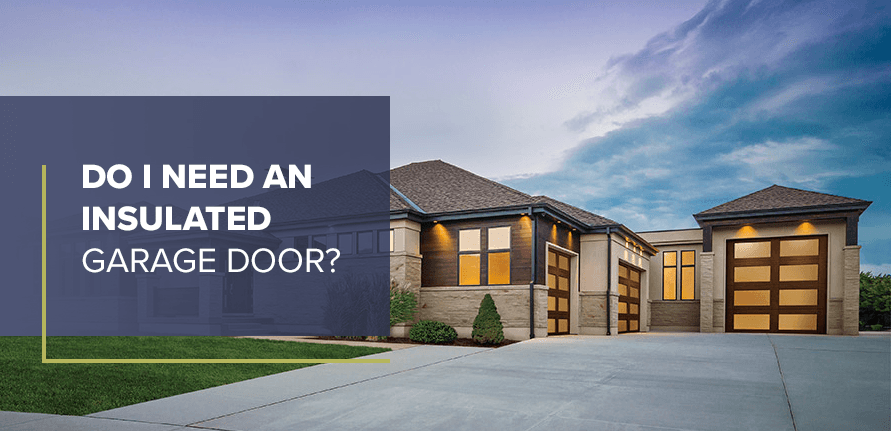
Do I Need an Insulated Garage Door?
Insulated garage doors are among the latest home remodeling trends because they’re eco-friendly and reduce energy costs. If you’re shopping for an overhead door, you’ll quickly notice most come with optional insulation. Why are so many homeowners jumping on the bandwagon, and is an insulated garage door worth it?
Garage door insulation offers many benefits to homeowners, with even more advantages in certain situations. For example, here in Minnesota, insulated garage doors are more beneficial than they are in moderate climates. At Crawford Door Sales, we’ll help you determine if you need an insulated garage door and recommend some styles you’ll love.
Benefits of an Insulated Garage Door
An insulated garage door limits the heat transfer between your garage and the great outdoors. It keeps warm air from escaping in the winter and seeping in during the summer. An insulated garage door offers many advantages, including:
1. Comfort and Convenience
An insulated garage door alone can turn your garage into a vestibule for your home. It creates a warmer buffer zone between the cold outdoors and your heated house. Your garage shouldn’t greet you with a blast of cold air every time you walk in. Raising the temperature a few degrees by keeping the cold air out can be an extra convenience in your busy life.
When you’re bringing in groceries, buckling kids into their car seats or digging through your storage containers, you’ll appreciate the added warmth provided by an insulated door.
2. Energy Savings
Without insulation, your garage door represents a massive gap in your home’s energy efficiency. If you have an attached garage, it likely shares at least one wall with the main part of your heated home. Many homeowners have a heated room directly above their garage. When your garage is properly insulated, your heating system doesn’t have to work as hard to keep your home comfortable. Improving your insulation by installing a garage door with a high R-value lets you realize energy savings.
Browse Our Residential Garage Doors
3. Quieter Operation
When Clopay® tested the sound levels for an insulated vs. uninsulated garage door, the analysis revealed insulated overhead doors are incredibly quiet by comparison. Specifically, an Intellicore® overhead door produces just 80 decibels (dB), compared to an uninsulated door’s 96 dB. Intellicore® doors are three times quieter to a human ear. Insulation reduces the noise garage doors make while in use by absorbing the vibrations. It can also hamper the sound a basketball or other airborne object makes if it hits your door.
The door’s quieter operation lets you use your garage without disturbing your family, pets or neighbors.
4. Durability
Garage door insulation comes from either polystyrene or polyurethane foam. It creates a thick, rigid layer between the panels of your overhead door, providing extra reinforcement. After repeated use, an insulated garage door will hold up better to daily impacts with fewer dents. A dinged-up overhead door will require repairs if the dents affect the door’s free movement. It can also lower your curb appeal, making an energy-efficient garage door a smart, long-lasting investment.
Reasons to Get an Insulated Garage Door
Almost any home can use some extra insulation on their overhead door, and some will reap more benefits than others. A few circumstances can make an insulated garage door worth the investment — it can even be a must-have.
You might need an insulated overhead door if:
1. You Want Protection From the Elements
A warmer garage is more comfortable and can have other benefits for your car and stored items. Here in Saint Paul, Minnesota, the winter’s average temperatures get as low as 7 degrees Fahrenheit and even lower as you travel farther North. Cold weather can cause problems for your vehicle and cause it to wear out faster.
Storing it in an insulated garage can let you go longer between trips to the repair shop and protect your battery, fluids and tire pressure. By keeping your garage warmer, you can also preserve the automatic opener and door hardware.
An insulated garage door, alongside effective weather stripping, can also keep out moisture. You can feel more confident storing photos, clothes or other items prone to moisture damage.
2. You Have an Attached Garage
If your garage connects to your house, a lack of energy efficiency makes it more expensive to heat your home. Heat escaping through an inefficient garage door will lower the temperature above or adjacent to your garage. Your heating, ventilation and air conditioning (HVAC) system will work harder and use more energy to compensate. An insulated garage door can provide more comfort throughout your home and reduce your energy bill.
3. Your Garage Is an Extension of Your Living Space
Many people treat their garage as a workshop, office or home gym. Some turn their garage into an entertainment room. Whatever you do with your garage, if you’re in there often, an energy-efficient door can add some extra comfort. If you spend lots of time in your garage, you might even have a space heater or permanent heating system hooked up. In that case, an insulated garage door is crucial to heat the space efficiently.
4. The Rest of Your Garage Is Insulated
If your walls and garage door windows are all properly insulated, one thing stands in the way between you and a more comfortable, energy-efficient garage — the door. Any uninsulated portion of your home is a chance for cold air to seep in and reduce your energy efficiency, including the door.
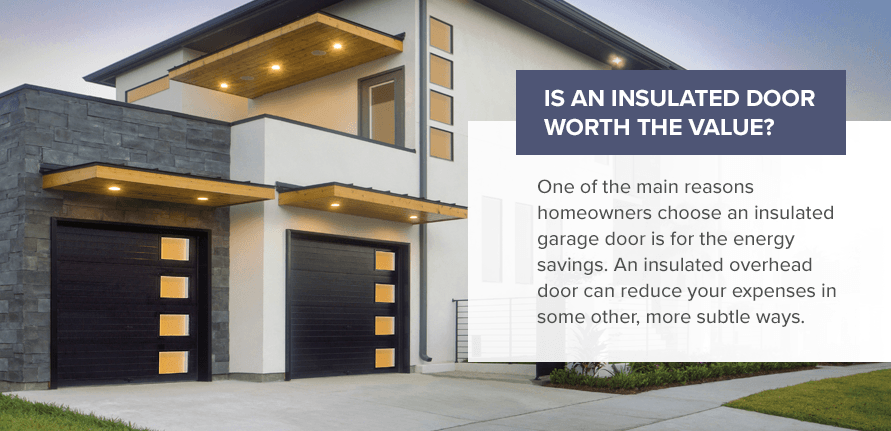
Is an Insulated Door Worth the Value?
One of the main reasons homeowners choose an insulated garage door is for the energy savings. An insulated overhead door can reduce your expenses in some other, more subtle ways. When taken together, the savings make insulated garage doors well worth the value. Plus, you can’t put a price tag on the extra quiet and added comfort you’ll experience.
Besides the energy savings, an insulated garage door makes smart economic sense for four reasons, including:
1. Longer-Lasting HVAC Equipment
With comprehensive insulation that includes the garage door, your HVAC system doesn’t need to work as hard to heat your home in the winter or cool it in the summer. Insulation usually translates into direct benefits to your energy efficiency, with the added advantage of less wear on the equipment. The system will last longer, reducing its lifetime cost.
2. More Protection for Your Car and Belongings
In a warmer garage, you’ll experience fewer cold-weather car troubles, including longer battery life and consistent tire pressure. You’ll spend less money replacing faulty batteries and spark plugs. Your transmission, engine and brake fluids will maintain better consistency. Any other fluids you store in your garage, including paint, motor oil and cleaning supplies, will last longer, too. You’ll waste less money throwing out and replacing these items prematurely.
Browse Our Residential Garage Doors
3. Added Resale Value and Curb Appeal
The average homeowner recoups 94.5% of their garage door’s value at resale. Insulated garage doors are in high demand thanks to their improved energy efficiency, which can add to your home’s value.
Even if you’re not quite ready to sell your home, consider investing in a durable, insulated overhead door. Since insulated garage doors are more durable, they look newer for longer, with fewer dents. A new overhead door will add to your curb appeal, which can entice more buyers and higher bids when you’re ready to sell. If you invest in a sturdy insulated door now, you’ll retain that curb appeal for years to come.
4. Flexible Price Ranges
When choosing an insulated garage door, you have a range of options. You can weigh the level of energy efficiency you want to achieve against your budget.
The two types of insulation are available at various thicknesses to suit your needs. Choose a 1 3/8-inch thick polystyrene-insulated garage door for moderate insulation at a lower price point. Or, go with a 2-inch thick spray-foam polyurethane door for maximum energy savings and insulation properties. Polyurethane foam expands to fill the entire cavity of your garage door, providing increased R-value and durability alongside quieter operation than polystyrene.
Order Your Insulated Garage Door From Crawford Door Sales!
Crawford Door Sales offers insulation options on most of the styles in our residential overhead door selection. Choose from polystyrene or Intellicore® insulation in several thicknesses and 2- or 3-layer construction. Find your stylish, energy-efficient garage door from Crawford Door Sales. We’re a locally owned business in West St. Paul, MN with over 50 years of experience delivering reliable overhead doors and helpful customer service to our community.
Browse our collection of residential garage doors and insulation options to find the perfect fit for your home. When you’ve found some you love, request an estimate and get connected with a helpful expert today.
The Importance of Annual Garage Door Maintenance
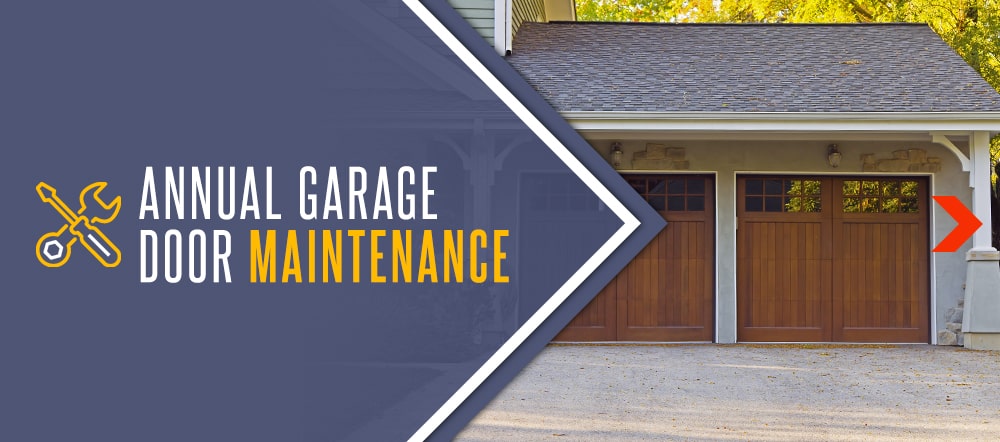
Annual Garage Door Maintenance
You likely don’t spend much time thinking about your garage door. It can be easy to forget that, unlike the other doors in your home, the garage door is an electrical appliance. As such, it’s as much in need of occasional maintenance as any other appliance in your home.
But how often do garage doors need to be serviced? If it’s been more than a year since you had it checked, you may already be behind. Even if you never notice any problems with it, it’s a good idea to get it checked on a yearly basis.
Why Is Garage Door Maintenance Important?
It’s hard to overstate the importance of annual garage door maintenance. As your garage door remains in place over time, it can start to accumulate various forms of damage that can prove both an inconvenience and a safety hazard down the road.
Types of Damage
Rust and erosion are natural occurrences in a garage door mechanism. No matter how well-sealed the door is, water will still inevitably make its way inside and cause damage to the metal structure. It can also cause the door panels to swell and warp.
Temperature can also play a role. In winter, for example, the metal parts of the mechanism can contract and tighten, preventing the door from opening. And in summer, the opposite can occur. Water and temperature aren’t the only sources of damage, either. Even when there’s no external cause of damage, the door can still deteriorate from general wear and tear.
Consequences of Damage
As the door’s quality goes down, so does its safety. A door with a broken spring, for instance, could come crashing down on you or your vehicle with the force of its full weight. You could also end up with a door that doesn’t stay closed, which leaves your garage open to intruders. Alternatively, your door could not be able to open. If it’s your main point of entry into the house, you could find yourself locked out of your own home.
Counteracting Damage
All of these problems can occur if you don’t properly maintain your garage door. Ideally, you don’t want to wait to get your door serviced until after the problems have already manifested.
At that point, you’ll have to live with the inconvenience until it’s fixed, and the process of repairing it will probably be much more complicated than it could have been. It’s better to have the door checked early and often, so you can catch any damage before it becomes an issue.
View Our Commercial Garage Door Maintenance Program
What Does Garage Door Maintenance Include?
The maintenance process for a garage door involves touching on all the areas where damage is most likely to occur. If you want, you can do an initial inspection on your own, checking for signs that damage has already occurred. Following that, though, you’ll need to call a professional to run the actual maintenance.
What to Look for Yourself
If you want to look over your garage door to see if you spot any already-existing problems with it, there are a few things you can check. You may even be able to make some simple fixes yourself. Here’s an overview of what to look for:
- Opener: First and foremost, simply check to see if the door opens and closes. Test each of your garage door openers.
- Loose parts: Inspect the mechanism around the door to see if there are any loose bolts or improperly connected parts.
- Tracks and rollers: Dirty tracks and rollers can cause your garage door to have trouble moving. Look for any dirty spots on them. If you find any, you can clean them off.
- Sensor: To make sure your garage door is safe, test the photo-eye sensor at the bottom. Open your garage door, and then block the photo-eye with something and try closing the door. Make sure the door is prevented from closing all the way.
- Fluid movement: Pull the emergency release cord to disconnect the door from the motor. Then try lifting it manually. See if it catches or has trouble moving anywhere.
- Balance: While the door’s still disconnected from the motor, lift it to around the halfway point and let go. It should stay in place. If it moves up or down, that indicates a problem.
- Wear and tear: Finally, go over the door itself, running a visual check for damage like dents or scratches.
Throughout this process, do not attempt to perform maintenance yourself, other than to wipe off the tracks and rollers and perhaps replace the batteries in your remote. In particular, don’t mess with the springs — they hold a high amount of elastic potential energy, meaning they could severely injure you if they were to break.
What a Professional Will Do
If you find any issues with your door during your own check, it’s definitely time to call a professional — but in truth, you probably want to call one even if you don’t find anything. Just because you don’t see a problem doesn’t mean there isn’t one there. When a professional checks your door, they’ll perform a few different maintenance tasks, such as:
- Lubricating: The professional will go over the door and lubricate tracks, rollers and cables.
- Tightening: They’ll check the chain and all the bolts, tightening any that are loose.
- Setting limits: The opener has set limits for how far to open and close the door. If these need adjusting, the professional will take care of it.
- Adjusting springs: They’ll inspect the springs and make sure they’re in good shape. If not, they’ll adjust or replace them.
Learn About Our Garage Door Repair Services
How Can Garage Door Maintenance Save You Money?
It might seem counterintuitive that getting annual maintenance service will save you money, but that’s exactly what it will do. The cost of an inspection is far less than the expenses it prevents.
When you don’t have your door inspected, damage is sure to accumulate over time. The longer it goes without being addressed, the worse the damage grows, until it causes a complete breakdown of the mechanism. With an annual inspection, a faulty spring will be caught and replaced — without one, it will eventually snap and send the door crashing down on whatever lies in its path.
Even if the damage doesn’t destroy the entire system, it will still force you to replace whole parts of the mechanism if you let it get to that point. It’s much less expensive to have a professional periodically clean a roller or tighten a bolt than to have to replace them entirely every couple of years.
Schedule Your Annual Garage Door Maintenance With Crawford Door Sales
Are you hoping to have your garage door serviced, but aren’t sure where to look? Crawford Door Sales has you covered. As the Upper Midwest’s top choice for commercial and residential doors, we offer service throughout the Twin Cities area. If your door’s giving you trouble, we’ll be there to look into it.
To start the process of fixing up your garage door, just get in touch with us today!


